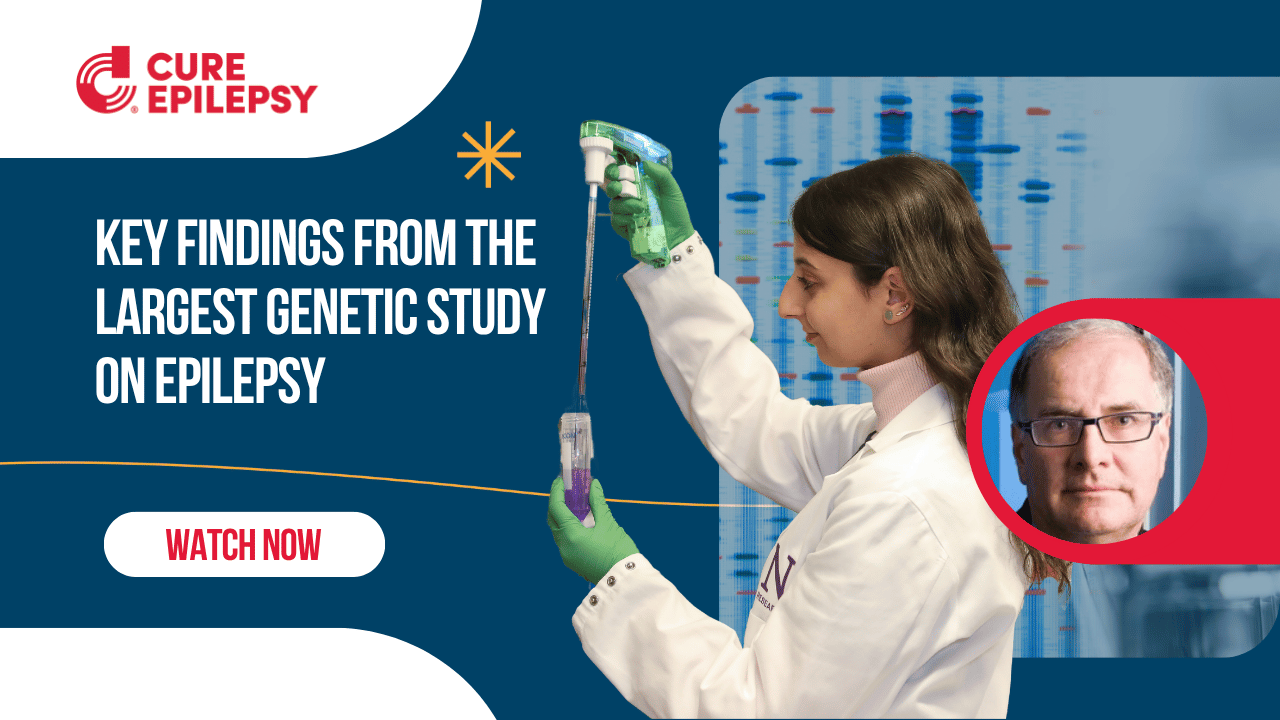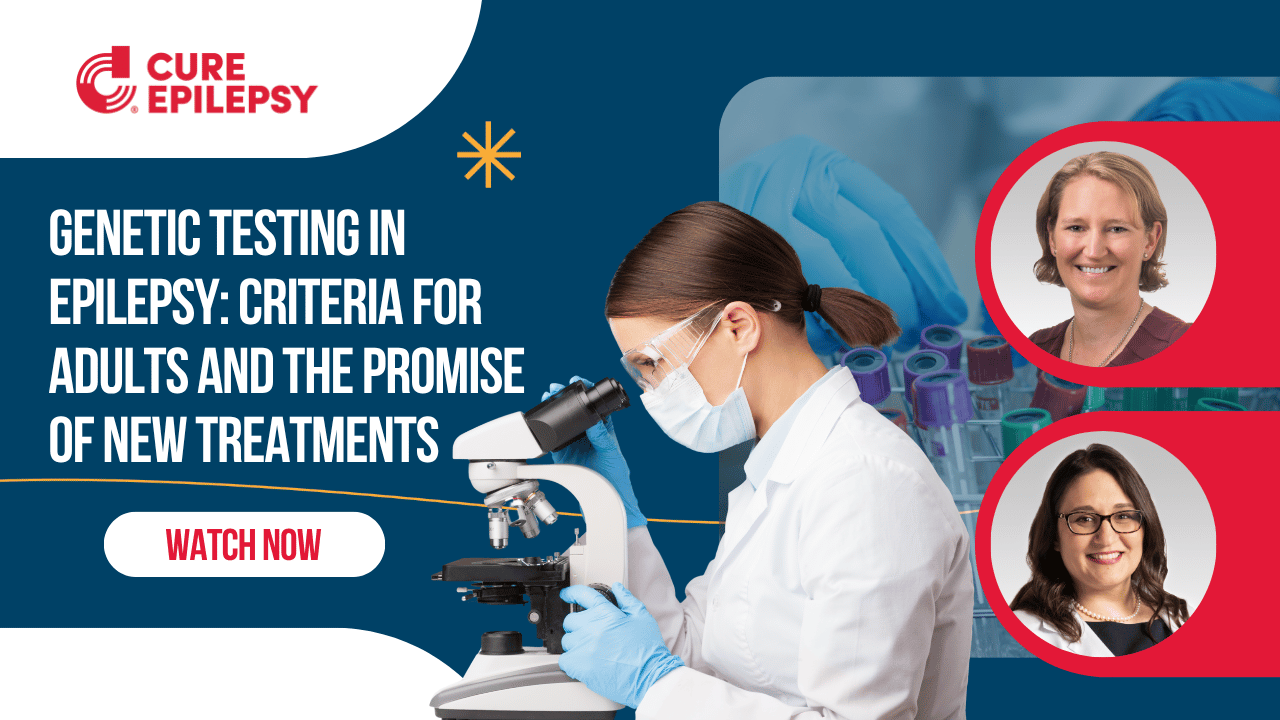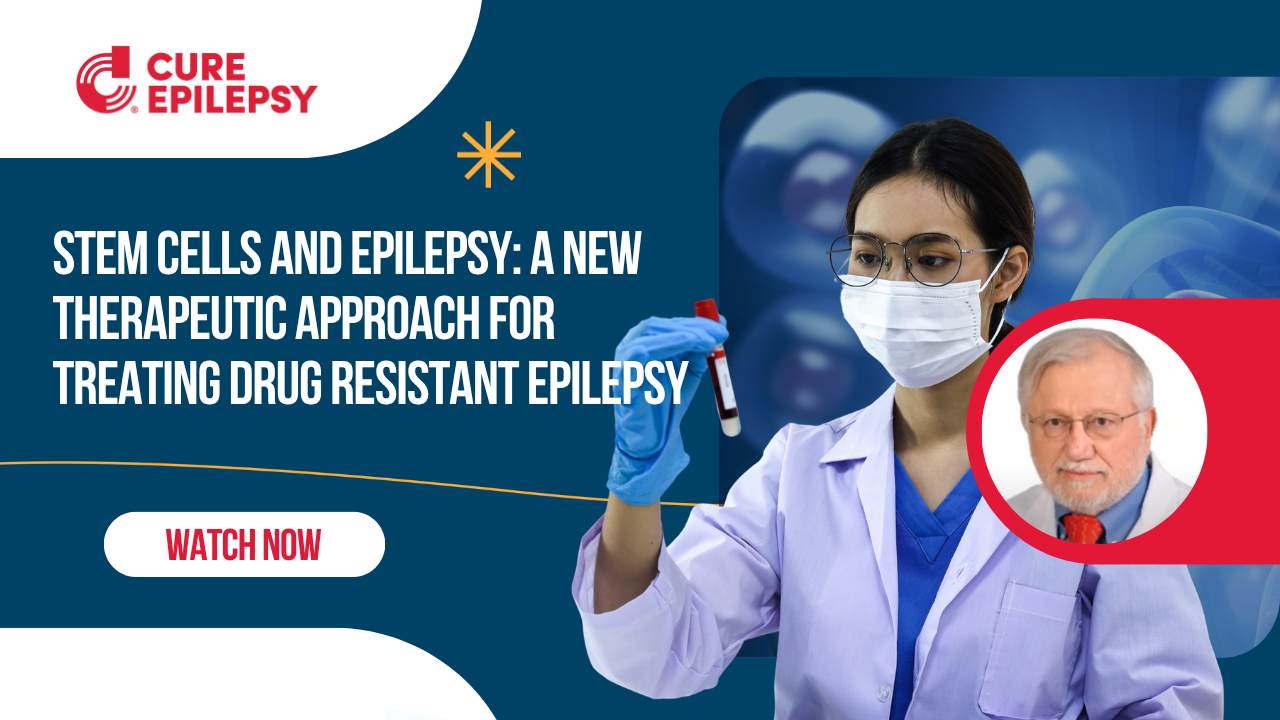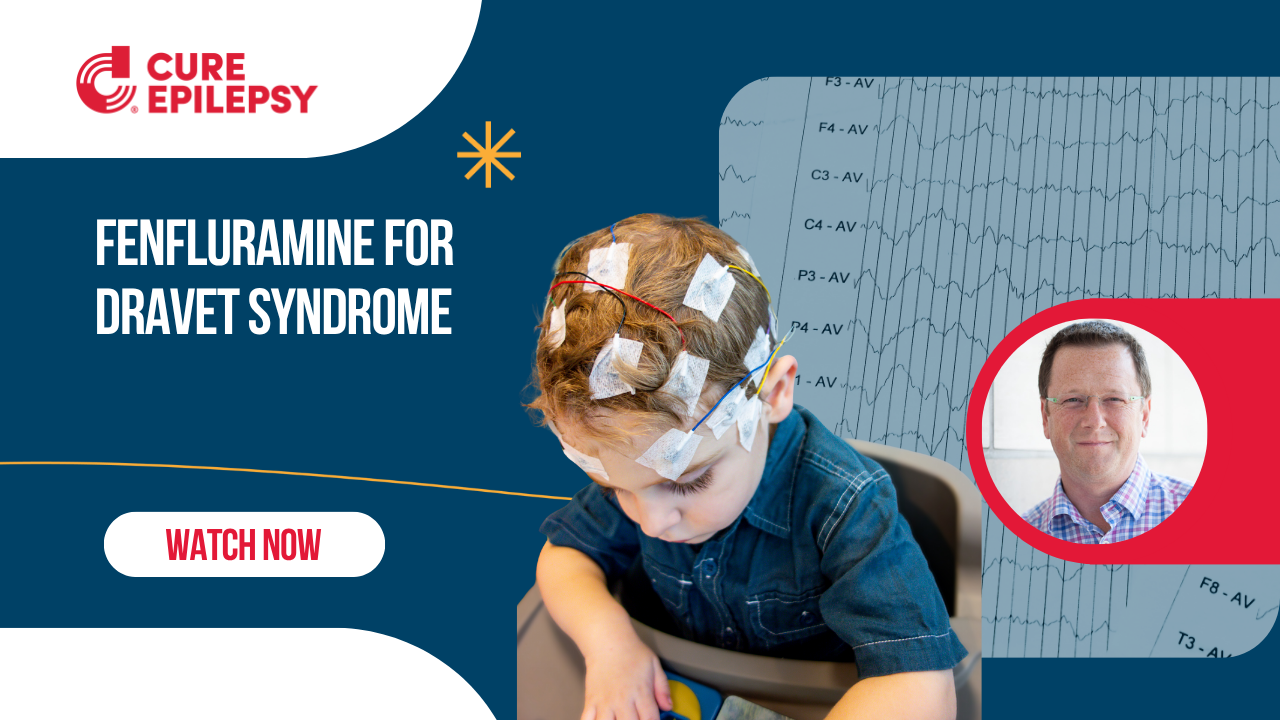Epilepsy Genetic Testing
Genetic testing has increased our understanding of the genetic causes of epilepsy exponentially in the past two decades, specifically helping researchers identify many genes responsible for rare childhood epilepsies. Recent studies found that in addition to providing patients and their loved ones some relief in ending their often too long diagnostic odyssey, genetic testing can enable tailored treatment options and can help with long-term outcome prediction, and family risk and planning decisions. However, there are still many individuals who lack a genetic diagnosis, including adults who may not even be aware that they could benefit from genetic testing.
This webinar will help viewers understand who may want to discuss genetic testing with their doctor and then will explore the following topics following genetic testing:
- How to read a genetic testing report.
- What are the different types of genetic results (or variants)?
- What are the differences between benign, pathogenic, and uncertain variants?
- What to do after receiving a genetic diagnosis.
- How do these results impact an epilepsy treatment plan moving forward?
This webinar is the first of two webinars in March that address CURE Epilepsy’s ongoing focus on epilepsy genetics and research in the rare epilepsies. Our second webinar will be presented by Drs. Gemma Carvill, PhD and Elizabeth Gerard, MD from Northwestern University focus on genetic testing in adults and will be held on March 22, 2024.
Speaker: Dr. Katie Angione
This webinar is being presented by Katie Angione, who is a neurology genetic counselor at Children’s Hospital Colorado in Aurora, Colorado. She provides genetic counseling for a diverse population of patients with complex neurological disorders with a focus on developmental and epileptic encephalopathies. Her primary goal as a genetic counselor is to support patients and their families through education, advocacy and research efforts focused on understanding the natural history of these conditions and eventually working towards precision diagnoses and treatments.
Q&A Transcript
A gene has been identified for Doose Syndrome but not for Juvenile myoclonic epilepsy (JME). What do we know about this?
So I know that Doose Syndrome or EMAS has a couple of different terms for it. It’s something that we’ve been trying for years to find the gene and there are definitely some genes that have been associated with it. There’s still multiple different genes that can cause that presentation. Doose is a clinical presentation and so there’s not one gene, one clinical diagnosis, there is a little bit more complicated than that. JME, I know that there are some gene associations. I’m not sure off the top of my head what they are. There’s so many genes at this point to keep track of. But again, I think there’s a lot of patients who have a JME presentation who we’re not able to find a genetic cause for. So that might mean there is a genetic cause, but we don’t know the full list of genes that could cause that type of presentation yet.
What about roadblocks to insurance paying for genetic testing? Do you have any recommendations for families who face that issue?
Yeah, that can be really tricky and my experience has been that insurance providers are always changing their policies. I would say that if you work with a provider who’s comfortable with ordering genetic testing, they might be able to go to bat for you a little bit. So we often will write letters of medical necessity. A lot of our physicians will have peer-to-peer discussions with insurance companies to explain the reasoning behind doing testing. But it might be helpful if you’re seeing that testing as getting denied, you might be able to request a copy of their policy and some, sorry, I’m losing my voice, some insurance providers actually cover very limited genetic testing, so maybe single gene or a very small panel or microarray. And then very extensive genetic testing, like whole exome sequencing, but they might not cover a lot of the panels that we typically send in between.
So that’s something we struggle with a lot is wanting to send something more targeted, but then only having the option to send something really comprehensive like whole exome sequencing. So I would say have that discussion with your provider that you’re talking with about genetic testing, about what those options are and if there’s something that would make sense to send that would fit within that insurance provider’s policy. There’s also some genetic testing labs that have pretty good self-pay options and patient assistance programs. So some of the labs that we work with commonly, Gene DX and Invitae, Prevention Genetics, worked with [inaudible 00:42:31] over time depends on the tests we’re wanting to send, but a lot of those commercial labs do have really good programs for self-pay options. So that’s something else to consider. I know sometimes going through a hospital system can lead to higher costs, but going directly to the lab might be more feasible. So that’s something to look into.
I know that there have been some free testing programs. Is that still the case for our community?
Yes. So I work in neurology and with epilepsy, so that’s my bias here. Those are the things I’m most familiar with. But Invitae does have a program called Behind the Seizure that is sponsored by a bunch of different pharmaceutical companies that are working on or that have treatments for some of the genes on that panel. So that is an option for children who have epilepsy that are under the age of eight would have access to that program. I know Invitae also has a long list of other sponsored programs that is always changing over time, so I’m not sure exactly what’s on that list right now. And then Prevention Genetics definitely also has some sponsored testing options as well. I would say that that’s another thing that family groups and patient advocacy groups are good at informing their community about. So that might be a place to turn if you’re looking for a sponsored test that would work for you or for your child..
Would you recommend siblings get genetic testing?
So it depends. So if there is say a diagnosis of a rare disease in a child and their siblings are also children, so they’re under the age of 18 and they’re not expressing any symptoms of that disease, we don’t typically recommend what’s called asymptomatic or predictive testing for siblings until they’re old enough to participate in that conversation. So that doesn’t necessarily mean 18. We definitely have those conversations with teens depending on exactly what the disorder is and what their level of understanding is. But in general, we try to avoid testing minors unless there is a specific treatment or something that could really impact the course of the disease. So if a sibling, for example, is diagnosed with CLN2 disease, which is a genetic disorder that does have a gene specific treatment, we might test a newborn sibling to see if they have that same disorder because we know that it can be helpful to treat very early on and can see potentially better outcomes when treatment is started earlier. So that would be the exception to that, is if there are potential treatment implications..
If children develop epilepsies, but there’s no known history for at least two generations, is there a benefit for the parents to get tested?
I do think it is still potentially beneficial for parents to get tested. So if a diagnosis is made in a child and there’s no family history. It depends on the specific gene, but there are some disorders where someone might actually carry a mutation but not have any apparent symptoms. So that could be helpful for knowing about potential recurrence risks. I would say tuberous sclerosis is a pretty decent example of that. It has a very wide range of severity. So we sometimes see patients in clinic who have that diagnosis, they have the genetic diagnosis, there’s no apparent family history, but then we test parents and one of the parents has the same change. So for things like that where there is a wide range of presentation, I think it can be helpful if you want to know for sure.
The information contained herein is provided for general information only and does not offer medical advice or recommendations. Individuals should not rely on this information as a substitute for consultations with qualified healthcare professionals who are familiar with individual medical conditions and needs. CURE Epilepsy strongly recommends that care and treatment decisions related to epilepsy and any other medical condition be made in consultation with a patient’s physician or other qualified healthcare professionals who are familiar with the individual’s specific health situation.
Stay in touch
Sign up for our email list and get the latest epilepsy news right to your inbox.









